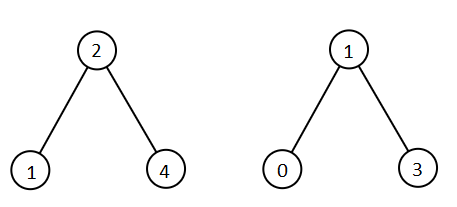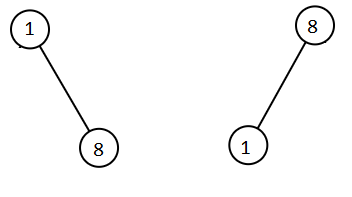给你 root1 和 root2 这两棵二叉搜索树。
请你返回一个列表,其中包含 两棵树 中的所有整数并按 升序 排序。.
示例 1:
输入:root1 = [2,1,4], root2 = [1,0,3] 输出:[0,1,1,2,3,4]
示例 2:
输入:root1 = [0,-10,10], root2 = [5,1,7,0,2] 输出:[-10,0,0,1,2,5,7,10]
示例 3:
输入:root1 = [], root2 = [5,1,7,0,2] 输出:[0,1,2,5,7]
示例 4:
输入:root1 = [0,-10,10], root2 = [] 输出:[-10,0,10]
示例 5:
输入:root1 = [1,null,8], root2 = [8,1] 输出:[1,1,8,8]
提示:
- 每棵树最多有
5000个节点。 - 每个节点的值在
[-10^5, 10^5]之间。
二叉树中序遍历 + 有序列表归并。
# Definition for a binary tree node.
# class TreeNode:
# def __init__(self, val=0, left=None, right=None):
# self.val = val
# self.left = left
# self.right = right
class Solution:
def getAllElements(self, root1: TreeNode, root2: TreeNode) -> List[int]:
def dfs(root, t):
if root is None:
return
dfs(root.left, t)
t.append(root.val)
dfs(root.right, t)
def merge(t1, t2):
ans = []
i = j = 0
while i < len(t1) and j < len(t2):
if t1[i] <= t2[j]:
ans.append(t1[i])
i += 1
else:
ans.append(t2[j])
j += 1
while i < len(t1):
ans.append(t1[i])
i += 1
while j < len(t2):
ans.append(t2[j])
j += 1
return ans
t1, t2 = [], []
dfs(root1, t1)
dfs(root2, t2)
return merge(t1, t2)/**
* Definition for a binary tree node.
* public class TreeNode {
* int val;
* TreeNode left;
* TreeNode right;
* TreeNode() {}
* TreeNode(int val) { this.val = val; }
* TreeNode(int val, TreeNode left, TreeNode right) {
* this.val = val;
* this.left = left;
* this.right = right;
* }
* }
*/
class Solution {
public List<Integer> getAllElements(TreeNode root1, TreeNode root2) {
List<Integer> t1 = new ArrayList<>();
List<Integer> t2 = new ArrayList<>();
dfs(root1, t1);
dfs(root2, t2);
return merge(t1, t2);
}
private void dfs(TreeNode root, List<Integer> t) {
if (root == null) {
return;
}
dfs(root.left, t);
t.add(root.val);
dfs(root.right, t);
}
private List<Integer> merge(List<Integer> t1, List<Integer> t2) {
List<Integer> ans = new ArrayList<>();
int i = 0, j = 0;
while (i < t1.size() && j < t2.size()) {
if (t1.get(i) <= t2.get(j)) {
ans.add(t1.get(i++));
} else {
ans.add(t2.get(j++));
}
}
while (i < t1.size()) {
ans.add(t1.get(i++));
}
while (j < t2.size()) {
ans.add(t2.get(j++));
}
return ans;
}
}/**
* Definition for a binary tree node.
* struct TreeNode {
* int val;
* TreeNode *left;
* TreeNode *right;
* TreeNode() : val(0), left(nullptr), right(nullptr) {}
* TreeNode(int x) : val(x), left(nullptr), right(nullptr) {}
* TreeNode(int x, TreeNode *left, TreeNode *right) : val(x), left(left), right(right) {}
* };
*/
class Solution {
public:
vector<int> getAllElements(TreeNode* root1, TreeNode* root2) {
vector<int> t1;
vector<int> t2;
dfs(root1, t1);
dfs(root2, t2);
return merge(t1, t2);
}
void dfs(TreeNode* root, vector<int>& t) {
if (!root) return;
dfs(root->left, t);
t.push_back(root->val);
dfs(root->right, t);
}
vector<int> merge(vector<int>& t1, vector<int>& t2) {
vector<int> ans;
int i = 0, j = 0;
while (i < t1.size() && j < t2.size())
{
if (t1[i] <= t2[j]) ans.push_back(t1[i++]);
else ans.push_back(t2[j++]);
}
while (i < t1.size()) ans.push_back(t1[i++]);
while (j < t2.size()) ans.push_back(t2[j++]);
return ans;
}
};/**
* Definition for a binary tree node.
* type TreeNode struct {
* Val int
* Left *TreeNode
* Right *TreeNode
* }
*/
func getAllElements(root1 *TreeNode, root2 *TreeNode) []int {
var dfs func(root *TreeNode) []int
dfs = func(root *TreeNode) []int {
if root == nil {
return []int{}
}
left := dfs(root.Left)
right := dfs(root.Right)
left = append(left, root.Val)
left = append(left, right...)
return left
}
merge := func(t1, t2 []int) []int {
var ans []int
i, j := 0, 0
for i < len(t1) && j < len(t2) {
if t1[i] <= t2[j] {
ans = append(ans, t1[i])
i++
} else {
ans = append(ans, t2[j])
j++
}
}
for i < len(t1) {
ans = append(ans, t1[i])
i++
}
for j < len(t2) {
ans = append(ans, t2[j])
j++
}
return ans
}
t1, t2 := dfs(root1), dfs(root2)
return merge(t1, t2)
}

